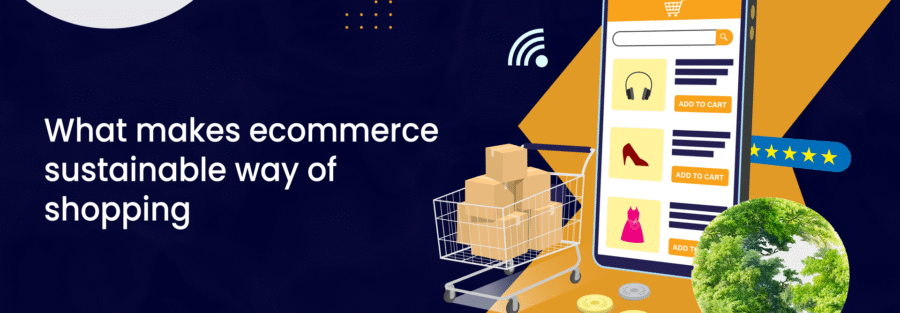
Every business in every industry holds a legal, ethical, and moral responsibility toward its environment. While this is true for any entity in any environment, the ways a business operates play a more significant role in its surroundings. Therefore, as responsible citizens, we must understand how our business activities affect the environment. Ecommerce is an emerging field in the retail industry – most businesses either have an online presence or aspire to have one in the future. The primary reasons behind the growing popularity of ecommerce are the increased market size and convenience for businesses and customers, respectively. However, on a macro scale, it also has significant environmental benefits for all of us.
Reduced utilization of resources
Physical stores occupy space, and we all can guess the enormous amount of resources used to keep them running – air conditioning & heating, lighting, and water usage for cleaning & landscaping. In contrast, an ecommerce store doesn’t require such a setup, and running is therefore much less resource intensive; this is not only good from an environmental point of view but also economically beneficial for the business.
Reduce emissions due to transportation
Transportation is one of the main contributors to global warming. The ecommerce ecosystem reduces the transportation needs of shoppers and eases the burden on the road infrastructure. The delivery truck can leave a single warehouse with orders for certain assigned areas instead of each shopper visiting the physical store. Furthermore, many ecommerce companies are adopting environment-friendly transportation measures, for e.g., electric delivery vehicles that further ease the environmental impact of trade.
Ecommerce encourages a circular economy
The advent of ecommerce has given rise to online marketplaces for used items. This encourages a circular economy by ensuring the use of products for a longer lifetime rather than going to waste or being disposed of which is damaging to the environment. Also, utilizing existing products for a long time period means that the need to create new products decreases, which incorporates various processes that are not good for the environment.
Reduced use of land
Environmental pollution, bad air quality index, and loss of natural habitat, these phenomena have gained significant attention in recent years. On a further note, it’s harmful to our health and contributes to global warming. Hence, it drives us to seek measures that mitigate the issue, such as developing green spaces, landscaping, and preserving natural habitats.
However, there’s already a scarcity of land in urban areas that confront environmental impacts the most, hence the need for resourceful utilization of land; physical stores take a lot of land that we can use instead to develop parks, open space, or preserve the natural environment. These measures would significantly improve the atmosphere of the area and the quality of life for its people. Therefore, ecommerce provides a means for achieving a more sustainable environment through reduced utilization of land area that we use to improve our environment.
The goal of technological advancement should be to bring positive impacts in our life. Ecommerce holds true to this by creating a more environmentally friendly ecosystem than traditional commerce. Therefore, assuming our responsibility towards the perseverance and sustainability of nature, we should consider incorporating this way of trading into our life.
The x2xecommerce team can implement an ecommerce store for you and integrate it with other business solutions to provide you with a connected business system. Reach out to the x2x team for any query or a free demo.




